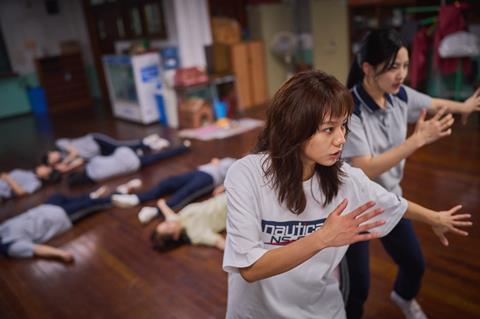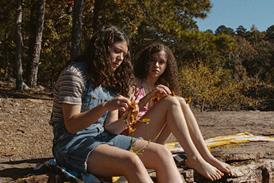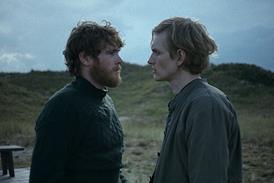
Lee Hye-ri spent three months training for Victory, a Korean comedy-drama centred on a cheerleading squad that has been set as the opening film of the 23rd New York Asian Film Festival (NYAFF).
Alongside daily hip-hop dance and cheerleading lessons, the actress took dialect coaching to ensure she passed for a resident of Geoje – located in the far south of Korea – and worked on costumes and hairstyling that would be suitable for the film’s setting of 1999.
Lee will receive the Screen International Rising Star Asia Award when Victory receives its world premiere at NYAFF on July 12, an honour that recognises emerging talent from Asian cinema and whose previous recipients include Japan’s Japan’s Masami Nagasawa and Ryohei Suzuki, Korea’s Kim Go-eun and Hong Kong’s Stephy Tang.
Lee, who first rose to fame as a member of K-pop group Girl’s Day where she was known as Hyeri, made her acting breakthrough with series Reply 1988 and My Roommate Is A Gumiho. Victory marks her third feature after period action horror Monstrum, which won the audience award at Sitges in 2018, and 2019 sports drama My Punch-Drunk Boxer.
Ahead of the opening night, Lee spoke to Screen about preparing for her latest role, international ambitions, upcoming feature Night Fever and her desire to play an icy character in a future project.
How does it feel to be coming to New York with the opening film of the festival?
When I first heard that Victory was selected as the opening film, I was so surprised and delighted. A few days later, I heard that I was chosen as an award winner, and I really couldn’t believe it. I’ve been to New York a few times for photoshoots or vacations, but this time going for a film festival invitation feels even more meaningful.
How did you prepare for your role in Victory?
I prepared various things for the character Pil-sun. Not only costumes and hairstyles, but also because the movie’s setting is Geoje, I practiced the dialect diligently. Also, starting three months before filming, I took hip-hop dance and cheerleading lessons. Almost every day, I practiced and harmonised with the Millennium Girls members in the rehearsal room.

What was the most challenging aspect of making the film?
Handling the regional dialect was my biggest concern since it was my first time. It felt like acting in a foreign language at times. Before learning, there were moments when I didn’t understand the meaning of certain lines. I spent a lot of time contemplating how each line should be delivered, considering the nuances.
During filming, I received a lot of help from actor Park Se-wan and staff members from Gyeongsang Province. Right before shooting, I would listen to and practice the dialect intonations and then go straight into filming. Since cheerleading emphasizes synchronisation, even during filming, I devoted a lot of effort to renting nearby studios or coordinating breathing on set to synchronize well. It wasn’t easy for the nine members of the Millennium Girls to dance as one body.
You will receive the Screen International Rising Star Asia Award at the festival. How does it feel to be recognised with this honour?
I was truly happy and couldn’t believe it at first, so all I could say was ‘Wow, really?’ Victory is a work that I truly love, so receiving this recognition meant even more. I heard that this award is given to actors with promising futures, so I accepted it as encouragement to work even harder in the future. I will continue to strive to show my best.
You have now been acting on screen for more than 10 years. What are the biggest lessons you’ve learned in terms of your skills as an actor and what do you consider your most rewarding role to date?
In reality, I am still learning a lot. As an actor, I believe the most important aspect is trusting the script and trusting myself while acting. However, there are still moments on set where I doubt myself. All the characters I’ve portrayed so far are precious to me, but if I had to choose, I would pick Pil-sun from Victory because she has given me the opportunity to have this interview.
Do you have ambitions to act outside of Korea and, if so, where?
If the opportunity arises, of course I would love to. Watching other Korean actors receive love from many countries sometimes makes me dream about working abroad myself. If given the chance in the United States, I would be truly happy.
What can you tell us about your role in upcoming film Night Fever?
In Night Fever, I played the role of Ari. Ari is a character standing at the edge of life. After fleeing to Thailand as if escaping from Korea, she struggles day by day in Bangkok and gets swept up in an event, leading her to fiercely fight to overcome it. It’s my first attempt at the noir genre, and the character is also a style I’ve never played before so I’m eager to meet the audience through Night Fever soon.
Are there roles or genres of film you would like to take on in future?
Up until now, the characters I’ve played have been warm or passionate in terms of temperature, but I also have a desire to portray a very cold and icy character. I hope to have the opportunity to do so someday.
























No comments yet